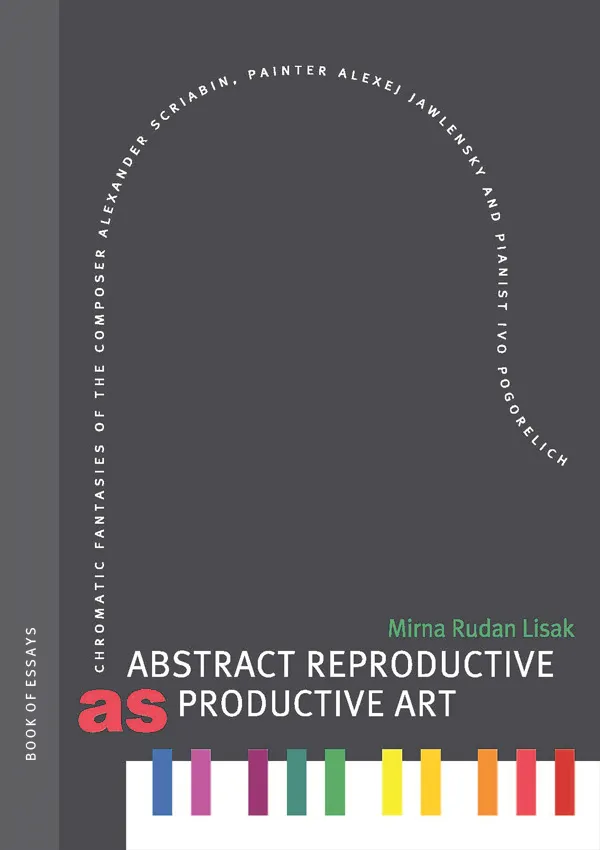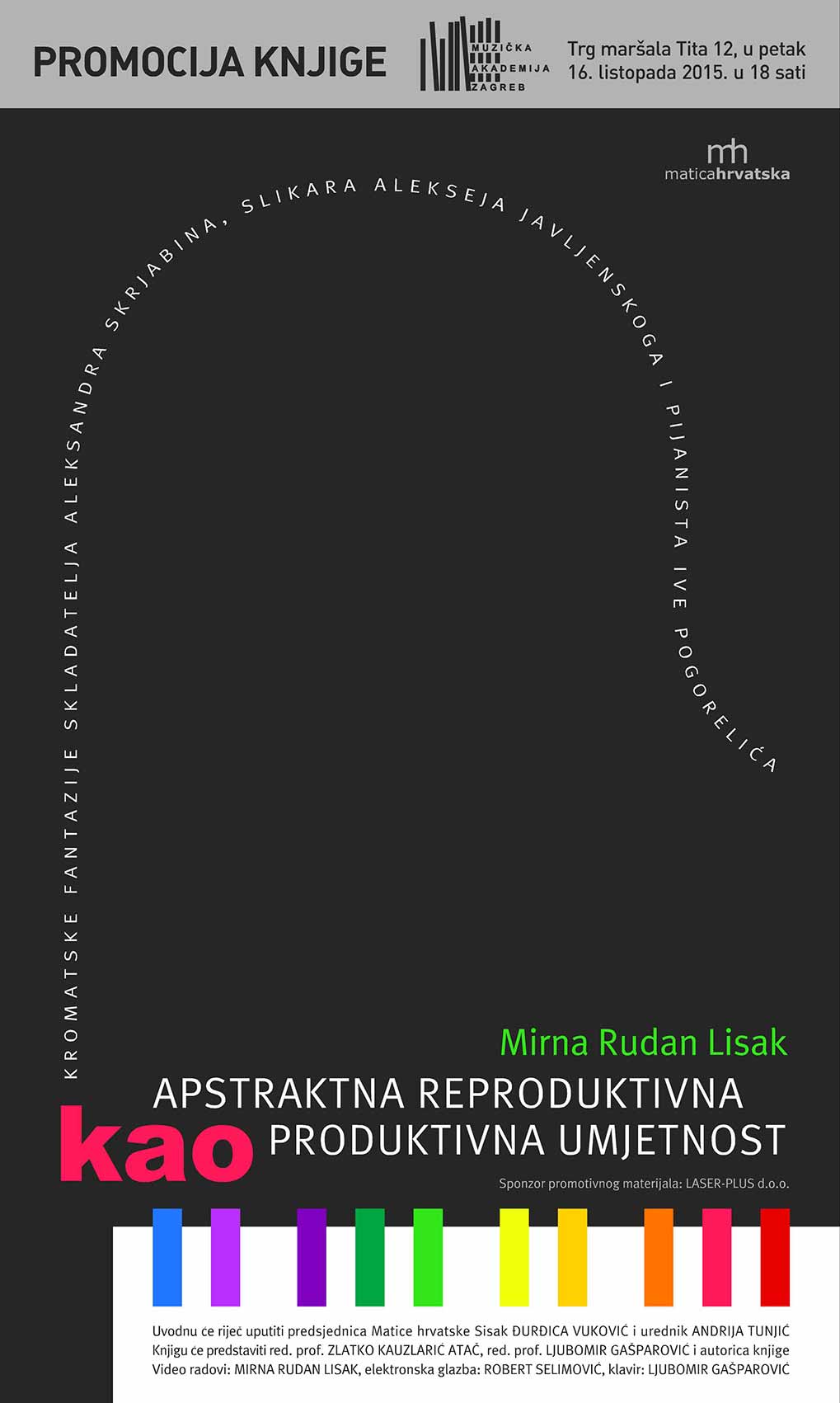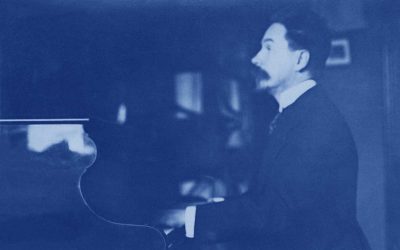Book ”Abstract reproductive as productive art”
Photo from the book promotion at the Zagreb Academy of Music

By Mirna Rudan Lisak, PhD
Jul 3, 2020
The first original book on Scriabin in Croatia
The book of essays entitled Abstract Reproductive as Productive Art: Chromatic Fantasies of the Composer Alexander Scriabin, Painter Alexej Jawlensky and Pianist Ivo Pogorelich is the result of interdisciplinary research of previously unrelated artists in order to create a dialogue between two branches of art—painting and music, but also productive and reproductive artistic practice. Abstract reproductive art is a novelty in artistic terminology: it is an artistic reproduction that renders the original work completely unrecognizable, despite keeping it completely unchanged. The term arose from the search for an answer to the question of whether and when reproductive art can be considered as productive art, about which I wrote in the introduction: “Two modern productive artists and a contemporary reproductive one—at first glance there do not seem to be any common characteristics in the work of the composer Alexander Scriabin, painter Alexej Jawlensky and pianist Ivo Pogorelich. However, when the chosen subject matter is approached in a multidisciplinary fashion, perception is no longer conditioned by a single absolute focus and all perspectives suddenly open up, offering many possibilities where new relations and connections are not only the result of observation but of imagination as well. That is the moment when the past, the present and the future intermingle and no obstacles stand in the way of synthesizing diverse epochs and branches of art undertaken to establish an analytical counterpoint among the three seemingly independent but nevertheless deeply connected essays, aiming to identify contemporary tendencies in art in order to find the answer to the question as to whether and when the reproductive art may be regarded as productive art.“
PROF. LJUBOMIR GAŠPAROVIĆ, PIANIST: “I read Mirna Rudan Lisak's book with great interest. Today, there are very few people who have an original idea, and although doctors of science or art should have original ideas for their theses, they are mostly taken from others, and then refined with new researches. The idea of Dr. Rudan Lisak is completely original and very interesting.”
Promotion at the Music Academy of the University of Zagreb
The book was presented at the Zagreb Academy of Music by editor Andrija Tunjić, Prof. Zlatko Kauzlarić Atač (painter) and Prof. Ljubomir Gašparović (musician), while Mrs. Đurđica Vuković, president of Matica hrvatska Sisak, greeted the audience. The speech of Prof. Atač was published in the magazine Riječi (Words), and as I wanted to prove that reproductive artists, like productive artists, can achieve the unrecognizability of the original, Prof. Gašparović played Scriabin’s composition Feuillet d’album Op 58 twice—at the beginning and at the end of the promotion—to show that the same composition can be played so originally that the impression of completely different works were played would be created. Along with Scriabin’s music, electronic music was composed for the promotion by Robert Selimović, and we listened to it upon entering the hall and as an accompaniment to my video-work Music iconostasis of the painter Alexej Jawlensky.
From the book to the founding of the Scriabin Society
Our famous pianist, Ivo Pogorelić was the first to buy the book, and it is featured on the official website of Alexej von Jawlensky Archiv S.A. from Locarno (Switzerland). It is kept in the Zagreb Libraries, the Library of the Croatian Academy of Sciences and Arts, Alexej von Jawlensky-Archive S.A. in Locarno (Switzerland), Memorial Museum of A. N. Scriabin in Moscow (Russia), Museum Wiesbaden (Germany) and Norton Simon Museum in Pasadena (USA). After the book was noticed by Alexander Serafimovich Scriabin, a descendant of the famous composer’s family, I responded to the invitation of the Memorial Museum of A. N. Scriabin and presented my work in Moscow in 2018, as part of the commemoration of the 100th anniversary of the Museum’s foundation. Then my essay on the mystic chord was translated and published in Russian, and the networking of professionals from the two countries led to the foundation of the Croatian Society Alexander Scriabin.
The famous Croatian pianist Ivo Pogorelich was the first to buy the book
The famous Croatian pianist Ivo Pogorelich was the first to buy the book
From the book to the founding of the Scriabin Society
Our famous pianist, Ivo Pogorelić was the first to buy the book, and it is featured on the official website of Alexej von Jawlensky Archiv S.A. from Locarno (Switzerland). It is kept in the Zagreb Libraries, the Library of the Croatian Academy of Sciences and Arts, Alexej von Jawlensky-Archive S.A. in Locarno (Switzerland), Memorial Museum of A. N. Scriabin in Moscow (Russia), Museum Wiesbaden (Germany) and Norton Simon Museum in Pasadena (USA). After the book was noticed by Alexander Serafimovich Scriabin, a descendant of the famous composer’s family, I responded to the invitation of the Memorial Museum of A. N. Scriabin and presented my work in Moscow in 2018, as part of the commemoration of the 100th anniversary of the Museum’s foundation. Then my essay on the mystic chord was translated and published in Russian, and the networking of professionals from the two countries led to the foundation of the Croatian Society Alexander Scriabin.
You may also like our other publications…
Translation of Igor Belza’s book on Scriabin
The book ”Alexander Nikolayevich Scriabin” written by Igor Belza was translated from Russian into Croatian and published by the Mala zvona publishing house
How I met Alexander Serafimovich Scriabin
Prof. Božo Kovačević, former Ambassador of the Republic of Croatia to the Russian Federation, writes about his friendship with Scriabin’s descendant
Valery Kastelsky and Scriabin’s Piano Sonata No. 7
R. Dalibaltayan about his Professor V. Kastelsky, one of the greatest pianists and pedagogues of the second half of the 20th century
Translation of Igor Belza’s book on Scriabin
The book ”Alexander Nikolayevich Scriabin” written by Igor Belza was translated from Russian into Croatian and published by the Mala zvona publishing house
How I met Alexander Serafimovich Scriabin
Prof. Božo Kovačević, former Ambassador of the Republic of Croatia to the Russian Federation, writes about his friendship with Scriabin’s descendant
Valery Kastelsky and Scriabin’s Piano Sonata No. 7
R. Dalibaltayan about his Professor V. Kastelsky, one of the greatest pianists and pedagogues of the second half of the 20th century
Travelogue: Conference in Moscow (2)
Mirna Rudan Lisak, Ph.D., on her lecture during the conference organized to mark the 100th anniversary of establishing the Memorial Museum of A. N. Scriabin (Moscow, Russia)




